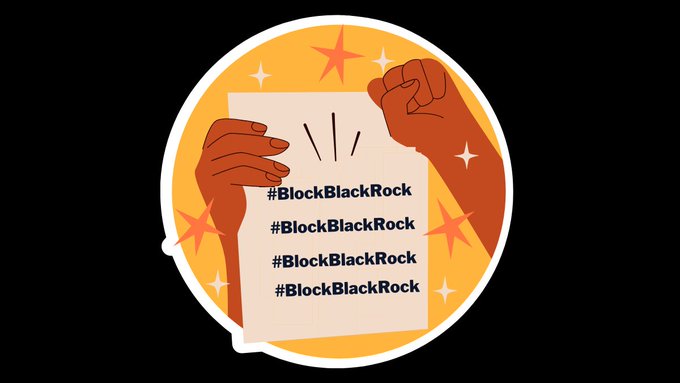
FAQ on WHY the UN Women and BlackRock partnership must be rescinded!
Over 500 feminist and women’s rights activists have signed-on a letter to UN Women calling for a rescinding of a partnership with BlackRock Inc. Click here to read the Letter with Feminist Demands.
Feminists are organizing an online public event on Tuesday 16 August 2022 to highlight why UN Women needs to rescind the partnership BlackRock and set standards for its private sector partnerships. Click here to register and join the online public event.
Below is more information/ FAQ on WHY the UN Women and BlackRock partnership is problematic from a feminist analysis, a human rights perspective, a multi-stakeholder approach and a futuristic re- imagination of a generation equality.
What has been agreed between UN Women and BlackRock?
At the World Economic Forum’s annual meeting at Davos on 25 May 2022, UN Women and BlackRock publicly announced they had signed a Memorandum of Understanding and issued coordinated press releases to elaborate on their new partnership. Their headline message was they would “promote gender lens investing”. BlackRock explained that it will “develop strategies to mobilize capital in support of economic opportunity for women.” UN Women will “serve as a knowledge partner and collaborate on data and research”.
What is the rationale for this public-private partnership?
According to their press releases: “By bringing together BlackRock’s deep investment experience across public and private markets and UN Women’s convening power and gender equality expertise, the partnership aims to catalyze the growth of gender lens investing and inspire greater mobilization of capital into companies that address women’s needs in education, financial services, childcare, healthcare, and other sectors. BlackRock and UN Women are united by the conviction that investing to help enhance the lives of women and girls around the world can increase their economic participation, realizing value and unlocking greater economic growth.”
Who is BlackRock Inc?
It is a U.S. multinational investment management corporation, and one of its founders back in the late 1980s was Larry Fink. According to one financial media outlet, BlackRock is now the largest money-management firm in the world with more than USD 10 trillion in assets under management, which is more than the gross domestic product of every country in the world, except for the US and China. This gives the firm enormous power over the global financial system.
What are the concerns about BlackRock?
Here is a selection of major concerns as analyzed and raised by feminists, activists, advocates, trade unionists, community movement leaders:
- Despite its efforts to portray itself as an industry leader in environmental, social and corporate governance, BlackRock has “faced criticism for worsening climate change, its close ties with the Federal Reserve System during the COVID-19 pandemic, anti competitive behavior, and its unprecedented investments in China.”
- BlackRock owns the debt of African countries – like Zambia – and made it clear earlier this year that these debts need to be honoured regardless of Zambia’s capacity to repay the loan.
- The report of the Committee on Workers Capital concerning BlackRock’s operations (2020) underpins the profound concerns on fundamental labour rights, for instance: ‘It voted against every CWC-supported voting recommendation highlighted in the report in the first half of 2020.’
- BlackRocksBigProblem is a website of a global network of NGOs, social movements, grassroots groups, and financial advocates that are pressuring asset managers like BlackRock to rapidly align their business practices with a climate-safe world. It states that BlackRock contributes to climate destruction by investing in fossil fuels, deforestation and rights violations, particularly that of indigenous communities. Moreover, according to its own website, BlackRock is the largest investor in weapon manufacturers through its U.S. Aerospace and Defense ETFund.
The previous partnership of UN Women with Uber:
During the UN Commission on the Status of Women (CSW) in 2015, UN Women announced its partnership with Uber which promised to create 1 million jobs for women. However, this would have meant the creation of one million precarious, informal jobs which represented exactly the type of structural inequality within the labour market that trade unions and the women’s movement has been fighting against for decades. Related resources: ITUC press release and UN Wom en’s withdrawal from the partnership.
Questions that UN Women has declined to answer:
- What did BlackRock pay for the use of the UN Women logo?
- What does UN Women get in return for the partnership with BlackRock?
- How will the partnership practically and sustainably transform the lives of women and girls and other marginalised groups in the poorest countries – the very groups UN Women was established to serve and empower?
- When will UN Women make the MoU public or at a minimum, release more public information about its contents?
- What due diligence criteria did UN Women use to assess the risks and benefits of entering into this partnership? Will it publicly share its risk mitigation strategy for the partnership?
- Will UN Women go further than putting the partnership on “pause” and publicly announce to have ended this partnership?
- What transparent measures and inclusive structures will UN Women institute immediately and consistently to halt the rising trend of UN-capture or “blue-washing” by select corporates?
It’s a fact. The UN Women and BlackRock partnership is problematic from a feminist analysis, a human rights perspective, a multi-stakeholder approach and a futuristic re- imagination of a generation equality. The partnership must be rescinded and an institutional commitment made across all UN agencies to resist corporate capture.
Compiled by CSOs of the Economic Justice and Rights (EJR) Action Coalition: CARE International, FEMNET, Huairou Commission, ITUC and the Women’s Working Group on Financing for Development (July, 2022).
